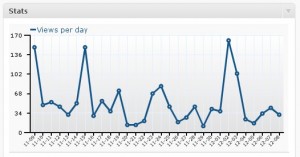
I have a slightly embarrassing secret!
I’m not a big fan of soap operas, but that’s
not the secret. In fact I’m quite happy avoiding the likes of Eastenders, Corrie and Emmerdale. My guilty secret is that I do actually watch one on a regular basis – Casualty.
Why Casualty? To me it seems a bit more escapist than most of the other soaps. Having said that, they all seem to have a much higher than average incidence of murder, tram crashes, pub fires, etc. these days! The main reason, though, is because my wife watches it. So its an excuse to snuggle up on the sofa. Her reason for watching Casualty is quite mundane, she works for the NHS and enjoys having a rant at some of the ludicrous storylines.
The most recent episode prior to this blog involved statistics. To be more precise, one of the casulaty doctors was nicknamed Dr. Death as her patient mortality rate was much higher than anyone else’s. Cue self doubt and an effort to get her away from the trauma room.
After the usual shenanigans, where serious injury causes people to ‘discover’ themselves and each other, it turns out that the bald statistics don’t tell the true story. The doctor’s high mortality rates were because she was consistently treating the most seriously injured patients. When the statistics were adjusted to take this into account, she turned out to be a very effective doctor, saving a higher percentage of patients than average.
Lies and statistics
There are three kinds of lies: lies, damned lies, and statistics.
This very famous quote has been used by Mark Twain and attributed to Benjamin Disraeli, although
that is now disputed. What is not disputed, though, is that a statistic, out of context, can be interpreted in many different ways.

Take your website statistics, for instance. I build website exclusively on the WordPress platform, and each installation very handily provides an ‘official’ plugin to allow you to view the number of people that look at pages on your website. Its extremely easy to install and enable the plugin, and once there each user gets a nice graph showing the number of visitors to their website.
Or does it? Lies, damned lies and statistics.
Looking at the stats above, you might think that the website in question had had about 170 visitors on the 2nd December. Not so!

The next report is generated by
Google Analytics, which I install on all my websites. You may need to click on the image right to see it full size. This report shows that the website actually had 55 visits on the same days, a huge difference. So why the disparity?
Pageclicks vs Visitors
The WordPress stats plugin shows the total number of pages displayed to visitors on a particular day, which will tend to provide the highest number of any stats. The report in Google Analytics, however, shows the total number of visits to the site on a particular day, in other words the number of visiting
sessions. In addition, the same person visiting twice within 30 minutes is counted as a single session. Two very different measures.
Is one right and one wrong? No, of course not. They are both accurate representation of what they measure. However, if people visiting your site tend to view a number of pages each time, then the numbers will differ quite considerably. So you need to know what you are looking at, and
what is important to you, when interpreting the stats.
Google Analytics
This is why I use Google Analytics. There are literally hundreds of report you can run on your site analytics, even down to tracking what route visitors take through your site. This is especially important on E-commerce sites, where you want people to choose products, view their basket and then checkout. Anything interrupting this process will cost you sales.
But even for standard sites it is important to know how well it is performing. For instance, if you run a marketing campaign for on of your products or services, you should expect to see hits on the relevant website page increase. Without analytics you won’t be able to see the impact of the campaign, and thus how effective your investment in marketing has been.
So my advice is, look at your stats and learn to understand what they are telling you. It’s an investment of your time that you won’t regret.
 I have a slightly embarrassing secret!
I’m not a big fan of soap operas, but that’s not the secret. In fact I’m quite happy avoiding the likes of Eastenders, Corrie and Emmerdale. My guilty secret is that I do actually watch one on a regular basis – Casualty.
Why Casualty? To me it seems a bit more escapist than most of the other soaps. Having said that, they all seem to have a much higher than average incidence of murder, tram crashes, pub fires, etc. these days! The main reason, though, is because my wife watches it. So its an excuse to snuggle up on the sofa. Her reason for watching Casualty is quite mundane, she works for the NHS and enjoys having a rant at some of the ludicrous storylines.
The most recent episode prior to this blog involved statistics. To be more precise, one of the casulaty doctors was nicknamed Dr. Death as her patient mortality rate was much higher than anyone else’s. Cue self doubt and an effort to get her away from the trauma room.
After the usual shenanigans, where serious injury causes people to ‘discover’ themselves and each other, it turns out that the bald statistics don’t tell the true story. The doctor’s high mortality rates were because she was consistently treating the most seriously injured patients. When the statistics were adjusted to take this into account, she turned out to be a very effective doctor, saving a higher percentage of patients than average.
I have a slightly embarrassing secret!
I’m not a big fan of soap operas, but that’s not the secret. In fact I’m quite happy avoiding the likes of Eastenders, Corrie and Emmerdale. My guilty secret is that I do actually watch one on a regular basis – Casualty.
Why Casualty? To me it seems a bit more escapist than most of the other soaps. Having said that, they all seem to have a much higher than average incidence of murder, tram crashes, pub fires, etc. these days! The main reason, though, is because my wife watches it. So its an excuse to snuggle up on the sofa. Her reason for watching Casualty is quite mundane, she works for the NHS and enjoys having a rant at some of the ludicrous storylines.
The most recent episode prior to this blog involved statistics. To be more precise, one of the casulaty doctors was nicknamed Dr. Death as her patient mortality rate was much higher than anyone else’s. Cue self doubt and an effort to get her away from the trauma room.
After the usual shenanigans, where serious injury causes people to ‘discover’ themselves and each other, it turns out that the bald statistics don’t tell the true story. The doctor’s high mortality rates were because she was consistently treating the most seriously injured patients. When the statistics were adjusted to take this into account, she turned out to be a very effective doctor, saving a higher percentage of patients than average.
 Take your website statistics, for instance. I build website exclusively on the WordPress platform, and each installation very handily provides an ‘official’ plugin to allow you to view the number of people that look at pages on your website. Its extremely easy to install and enable the plugin, and once there each user gets a nice graph showing the number of visitors to their website.
Or does it? Lies, damned lies and statistics.
Looking at the stats above, you might think that the website in question had had about 170 visitors on the 2nd December. Not so!
Take your website statistics, for instance. I build website exclusively on the WordPress platform, and each installation very handily provides an ‘official’ plugin to allow you to view the number of people that look at pages on your website. Its extremely easy to install and enable the plugin, and once there each user gets a nice graph showing the number of visitors to their website.
Or does it? Lies, damned lies and statistics.
Looking at the stats above, you might think that the website in question had had about 170 visitors on the 2nd December. Not so!
 The next report is generated by Google Analytics, which I install on all my websites. You may need to click on the image right to see it full size. This report shows that the website actually had 55 visits on the same days, a huge difference. So why the disparity?
The next report is generated by Google Analytics, which I install on all my websites. You may need to click on the image right to see it full size. This report shows that the website actually had 55 visits on the same days, a huge difference. So why the disparity?
I always wondered about the disparity between wp-stats and Google Analytics.
thanks!